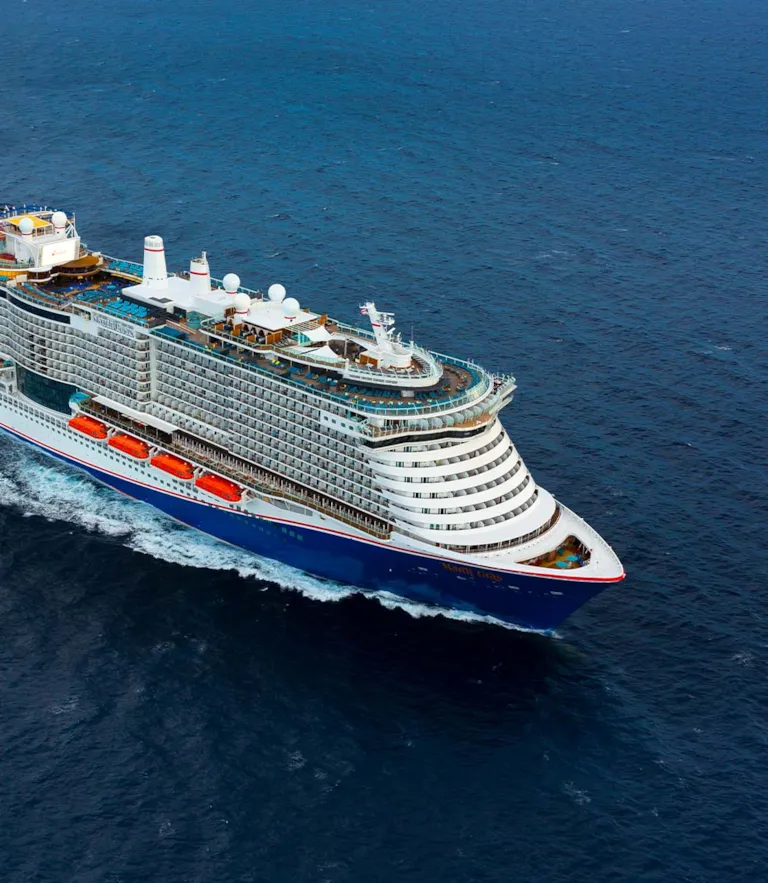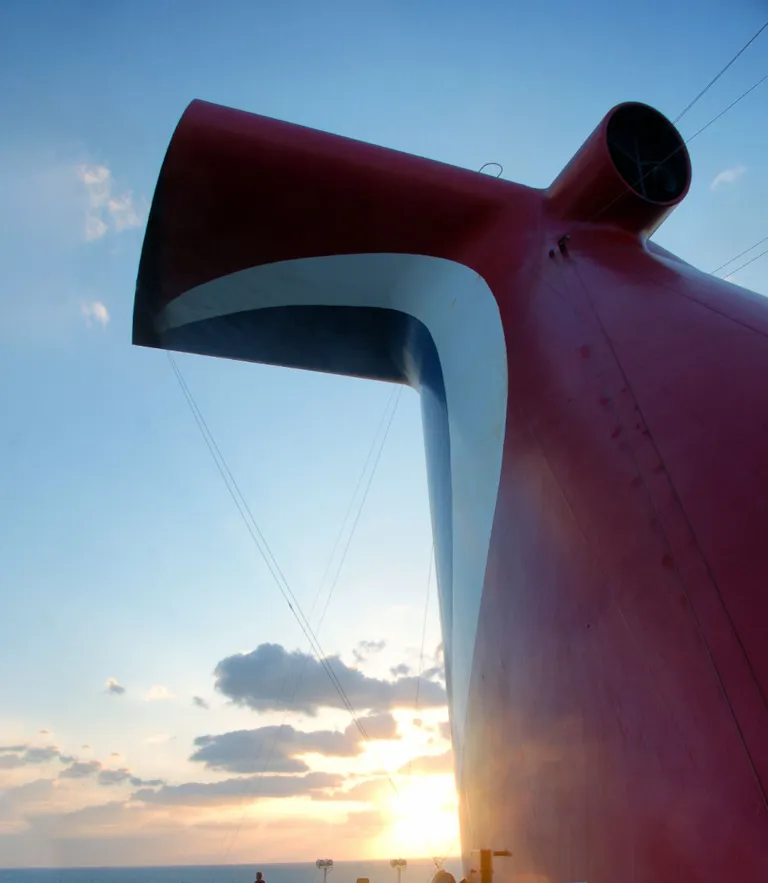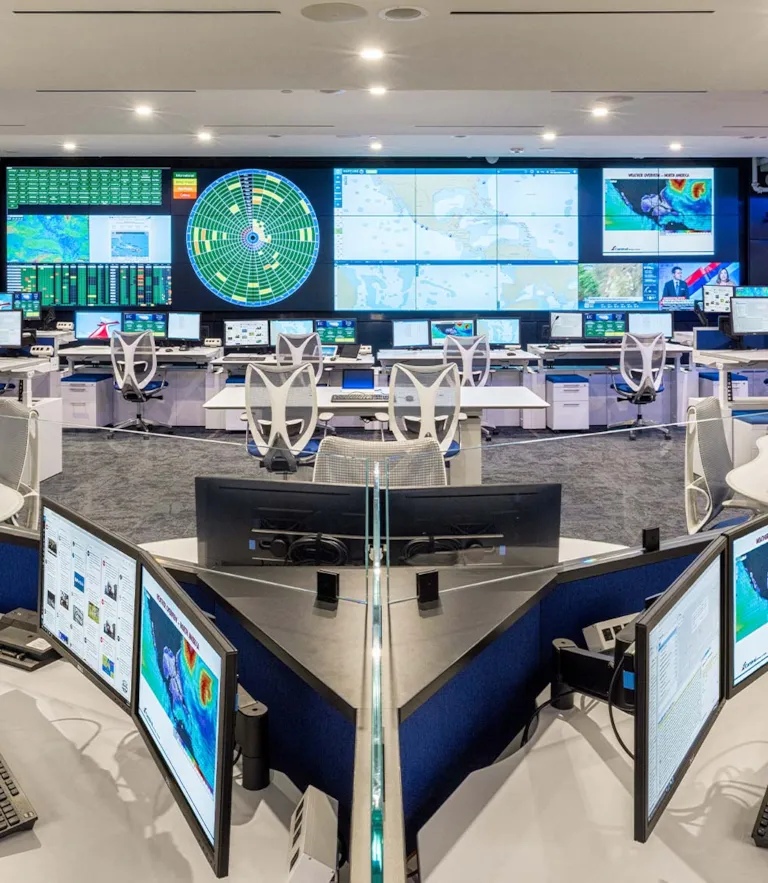Building on 50 years of experience to tackle future challenges
Carnival Cruise Line has been a leader in the cruise industry for half a century. Carnival’s VP of Technical Operations looks at the recent challenges and how the cruise operator is preparing for a decarbonized, digitalized future.
The Miami-based cruise operator recently celebrated its 50th anniversary. Martina Gallus, Vice-President of Technical Operations at Carnival Cruise Line, joined Capt. Antonio Prestigiacomo, Business Development Director and Head of Maritime Academy Americas at DNV, to talk about new and old challenges and give an insight into Carnival’s approach to feasible solutions.
As in the maritime industry in general, the cruise sector is faced with many challenges that require new solutions and processes. With the emergence of the pandemic, new measures to protect the health of passengers and crew had to be developed and implemented. The open question of when guests can be welcomed on board again placed a great economic burden on many cruise companies. But with the effective dates of regulations aimed at reducing CO2 emissions coming closer, cruise companies are continuing their efforts to decarbonize and utilize digitalization tools as efficiency enablers, all while keeping safety as a top priority.

Navigating through an unprecedented pandemic
As VP of Technical Operations, Gallus oversees the technical marine functions across the Carnival fleet of currently 23 ships in operation and two under construction. Her responsibilities range from repair and maintenance, refurbishment projects and the related technical services for on-board assets to safety and security.
Reflecting on the past few years on how Carnival handled the pandemic, Gallus says: “Like all the other cruise companies and the broader shipping industry, Covid created many challenges. While it was a rough period, through the health and safety protocol we created we were able to respond and bring our vessels back into guest operation successfully.” Carnival went to great efforts to manage and reduce the exposure risk. “Numerous measures were implemented, for instance relating to the HVAC systems to maximize fresh air circulation on board,” says Gallus. “To improve air quality and filtration, we outfitted the vessels with high-efficiency particle air filters and further segregated areas of the on-board ventilation system.”

The post-Covid crewing challenge
But this was just one aspect of getting ready to return to service. Like every cruise ship operator, Carnival was forced to reduce its workforce during the pandemic, leaving former employees to find work elsewhere. “Upon returning to guest operations, we found ourselves facing an employment gap,” she continues. “It’s been a struggle, but through proactive recruiting efforts, we’ve managed quite well, so many of our vessels are sailing again; we’ve been able to train personnel where needed and bring them up to speed.”
“I wonder how you are now managing to maintain all the stores, spares and equipment needed on board for your operations?” asks Prestigiacomo. “It’s not unlike the constraints that society is facing,” responds Gallus. “Surely it is a strained supply chain, but our team has done an amazing job making sure that we have all the materials necessary to operate the vessels, not to mention the dry docks! It was a very crowded season for dry docks last year. This community and our supply chain made it happen despite the global challenges.”

LNG and methanol as stepping stones towards decarbonization
Regarding decarbonization, Carnival Corporation is leading the effort among its sister brands, Gallus points out. “Our brands in Europe have been operating LNG vessels for some time, and here we have the Mardi Gras as the first cruise ship burning LNG in the U.S.” While LNG is not carbon-neutral, it is important as a bridging fuel, comments Prestigiacomo: “It brings many possibilities for phasing in other fuel types which are not yet viable.” DNV’s Maritime Forecast to 2050 model suggests that the future will bring increasing diversity in fuel choices, including synthetic fuels, biodiesel, hydrogen and ammonia, all of which will take a considerable time to develop.
“LNG is a stepping stone for the next one or two vessel generations and provides us with an opportunity to gain experience,” says Gallus. DNV has worked with cruise ship companies and shipyards to examine potential future fuels, Prestigiacomo points out. “We identified ammonia, methanol and LNG as good candidates,” he says. “Ammonia does not produce any CO2 emissions but may not be the right fuel for cruise ships. A dual-fuel solution using LNG and methanol is more appropriate, but more research needs to be done. Cooperation among vessel operators, suppliers, manufacturers and the local authorities will be essential.”

A safety emphasis from the start
The safety of its guests has been a top priority for Carnival since the company’s founding. “Our safety culture is so important that we read our common vision at the start of every meeting,” says Gallus. “It states that ‘At Carnival Corporation & plc, our highest responsibility and top priorities are to operate safely, to protect the environment, and to be in compliance everywhere we operate in the world.’”
A company’s safety record and culture ultimately depend on its personnel, Gallus points out. “We don’t use life-saving appliances, like our firefighting systems, the watertight doors and so on, daily. However, the crew must be familiar with them so that when an event arises, they know what to do. So we train!”

Cooperation with class strengthens safety
Carnival is also intensifying its maintenance of these systems. “This raises awareness among our suppliers, vendors and manufacturers that we hold safety in the highest regard,” says Gallus. “And we rely on class expertise to gain a different point of view on the common challenges that we all face. Class is like a sparring partner who challenges us to further strengthen the areas where we are strong while helping us to improve in weaker areas.”

Riding the digitalization wave
The cruise segment has been leading the shipping industry in embracing digitalization. In early March Carnival announced the launch of the VeriFLY™ health-screening app in all its U.S. homeports. “Now, vaccinated guests can submit their information to the app in advance, which cuts the time for the health assessment during embarkation nearly in half,” says Gallus.
“Digitalization has had a huge impact on how vessels are maintained and operated today,” says Prestigiacomo. In early 2018, Carnival Cruise Line rolled out a 3,250 m2 Fleet Operations Center (FOC) in Miami. “Our FOC is a game changer,” says Gallus. “Its tracking and data-analysis platform enables real-time information-sharing between our ships and specialized shoreside teams to support fleet operations. We have access to weather, itinerary updates, safety, engine and environmental updates for each vessel. The FOC has provided immense decision-making support.”

Exceptional cruise culture
Gallus and Prestigiacomo agree that Carnival has succeeded in inspiring loyalty from both its passengers and crews. “I think the secret is that every person is recognized as important and is welcomed into this big community that is Carnival,” says Gallus. “Ted Arison, the founder of Carnival Cruise Line, said that we need to treat everybody like family. I think that’s what has made us successful.” Prestigiacomo agrees. “I started sailing for Carnival in 1999, and even then there was a feeling that we were a family; just a sense of belonging.”
“We embrace diversity at Carnival,” stresses Gallus. “Everyone has a place, and we all feel it’s our responsibility to protect that. I think of Carnival as something similar to a kaleidoscope. Every day you have these encounters with the crew, passengers, our communities or industry partners. Each encounter provides something different and invites you to grow and to shift your perspective, helping you to witness more of the beauty that Carnival has to offer.”

Antonio Prestigiacomo
Director Cruise Center
- Carnival Cruise Line
- Herkie, CC BY-SA 2.0 <https://creativecommons.org/licenses/by-sa/2.0>, via Wikimedia Commons
- Carnival Cruise Line
- DNV